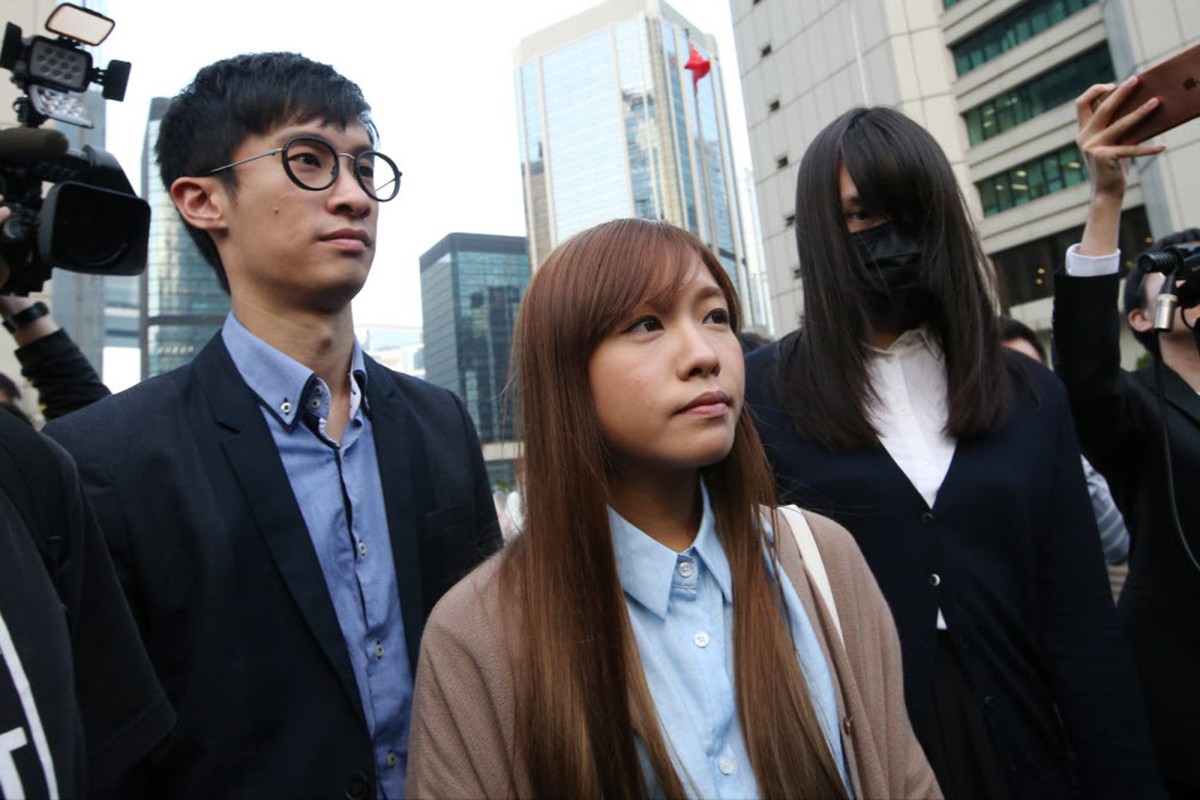
Lau Siu-lai, who took too much time during her oath, along with Nathan Law could be targeted next
 (From left) Lawmaker-elects Sixtus Baggio Leung Chung-hang and Yau Wai-ching could could effectively be disqualified from Legco.
(From left) Lawmaker-elects Sixtus Baggio Leung Chung-hang and Yau Wai-ching could could effectively be disqualified from Legco.Beijing’s intervention in the oath-taking controversy not only could effectively disqualify two localist lawmakers, it may fuel possible legal challenges to unseat at least two others who have been sworn in.
The ruling could also have a bearing on election petitions filed by two independence advocates who were barred from taking part in the Legislative Council elections.
While Beijing says its interpretation of Article 104 of the Basic Law regarding oath-taking requirements would have retrospective effect, Hong Kong officials say it would not automatically disqualify anyone and it would be left to local courts to apply the ruling should any legal challenge arise.
The interpretation issued on Monday elaborates what would constitute a valid oath and defines what “swearing in accordance with law” means: lawmakers and public officials must read out the prescribed oath “sincerely”, “accurately and completely”.
A person deliberately failing to do so will be considered as “declining” to take the oath under the Oaths and Declarations Ordinance – and face disqualification. He or she would not be allowed to retake the oath.
The High Court has still to hand down judgment on a judicial review sought by the government to disqualify Sixtus Baggio Leung Chung-hang and Yau Wai-ching, who used derogatory language to insult China in their oaths. It has asked parties to hand in submissions in view of the Beijing ruling by Thursday.
But legal scholars such as Eric Cheung Tat-ming of the University of Hong Kong said Beijing’s decision was so all-encompassing that the court would have little choice but to rule the pair be removed from Legco.
The next target could be Lau Siu-lai, whose first oath was invalidated because she paused too long – six seconds – between each word. Lau, an advocate of self-determination, was sworn in later after she read the word at usual speed at her second attempt.
Even before Beijing handed down its decision, the pro-Beijing camp had been calling for Lau’s disqualification, picking on her Facebook post in which she said she meant to pause in order to nullify the oath – proof, the camp said, that she was not sincere.
Lau is facing two election petitions filed by voters in her constituency, for which the court has yet to schedule hearings. The lecturer said yesterday she would seek legal advice for the legal challenge. “It’s not my own concern [about losing my seat] now,” she said. “I believe not just me, but also several other lawmakers, may become embroiled.”
Asked whether the Beijing ruling would be retrospective and affect lawmakers who had already assumed office, Secretary for Justice Rimsky Yuen Kwok-keung said it could be applied by Hong Kong courts to past oath incidents, including those that were being dealt with by the court but had not yet reached the Court of Final Appeal.
He said it would be up to the court to apply the decision to the facts and make its own judgment.
Disqualifying Lau would have serious implications on the power share in Legco as it would remove the pan-democrats’ power to stall controversial government bills or funding requests by way of filibustering.
While the pro-Beijing camp wants to get rid of Legco rules that enable filibustering, to amend the rules it needs a simple majority in both the geographical and functional constituencies.
If Leung, Yau and Lau are all kicked out, the pan-democrats would lose their majority in the geographical constituency, having a 16-16 tie with their rivals.
Lau’s ally, Nathan Law Kwun-chung, could also be challenged for his intonation while taking the oath, Cheung said. The former Occupy Central student leader raised his tone when he swore allegiance to Hong Kong as part of China, as if he was asking a question rather than reading a statement, but his oath was accepted.
“Beijing loyalists could argue Law was not ‘solemn’,” Cheung said. “It is a matter of political consideration now – the interpretation could become a tool to exercise political screening.”
“The court may not accept the arguments and disqualify people like Law in the end, but the litigation process would be enough trouble for the [lawmakers].”
The Beijing ruling also controversially provided that swearing allegiance to Hong Kong as part of China was a precondition for “standing for election”. Constitutional law professor Johannes Chan Man-mun said this provision overreached Article 104, which only covered the oath-taking of elected lawmakers.
But should Beijing insist the conditions applied even for Legco election candidates, the ruling could be unfavourable to Edward Leung Tin-kei and Andy Chan Ho-tin, who have both filed election petitions after they were disqualified.
The two activists were rejected by returning officers who ruled they were not “genuine” in their declarations to uphold the Basic Law, which were submitted with their nominations.
A timeline of the oath taking drama
November, 2 - Legco chaos and fighting on the floor as two localists storm the meeting
November, 1 - CY Leung ‘can’t rule out’ asking Beijing to interpret Basic Law over Hong Kong oath-taking saga
October, 26 - Localists defy oaths ban and attend Legco meeting
October, 26 - Hong Kong Legco president makes U-turn on oath-taking by localists
October, 19 - Legco chaos as lawmakers storm out, oath-taking postponed and luncheon meat hurled
October, 18 - Andrew Leung invalidates the oaths of lawmakers Lau Siu-lai and Wong Ting-kwong